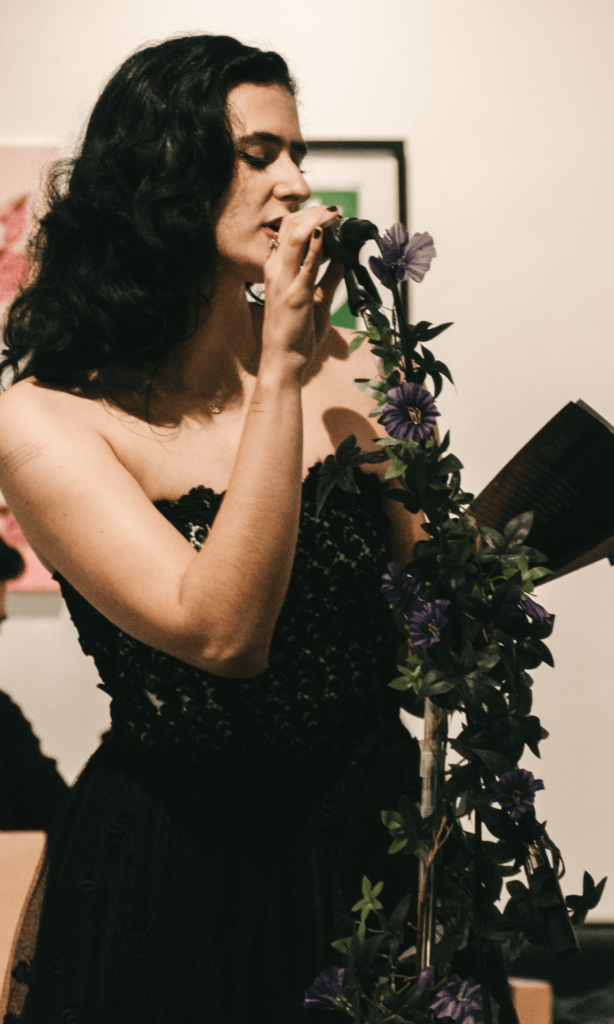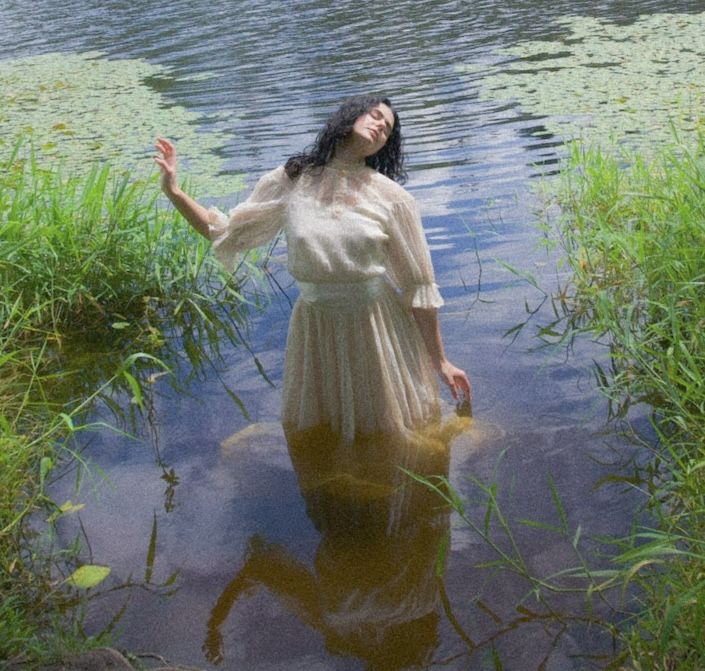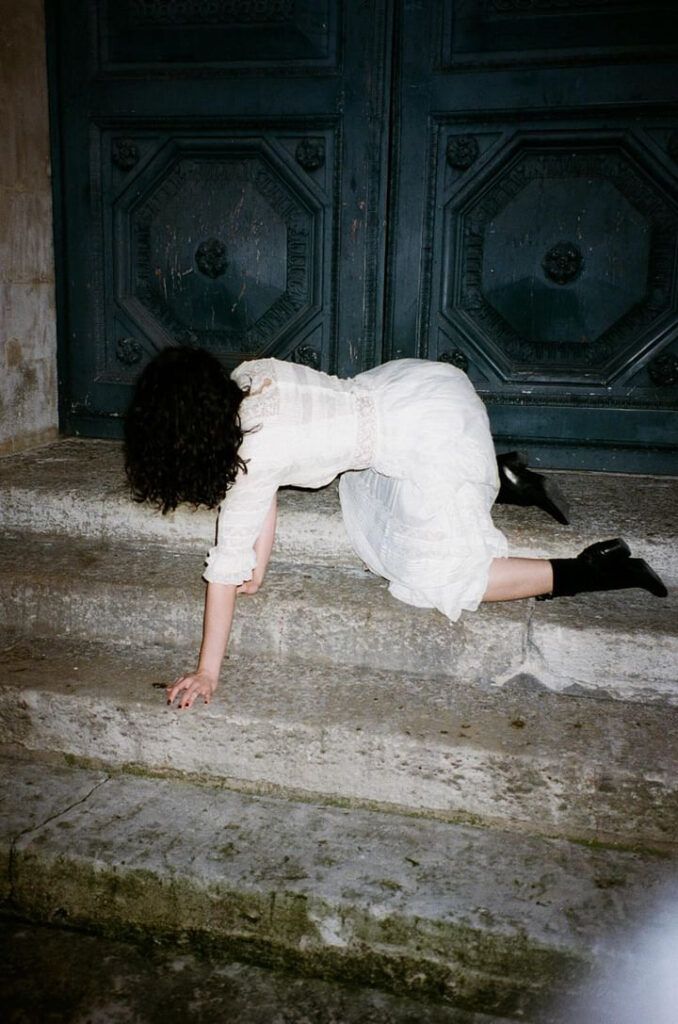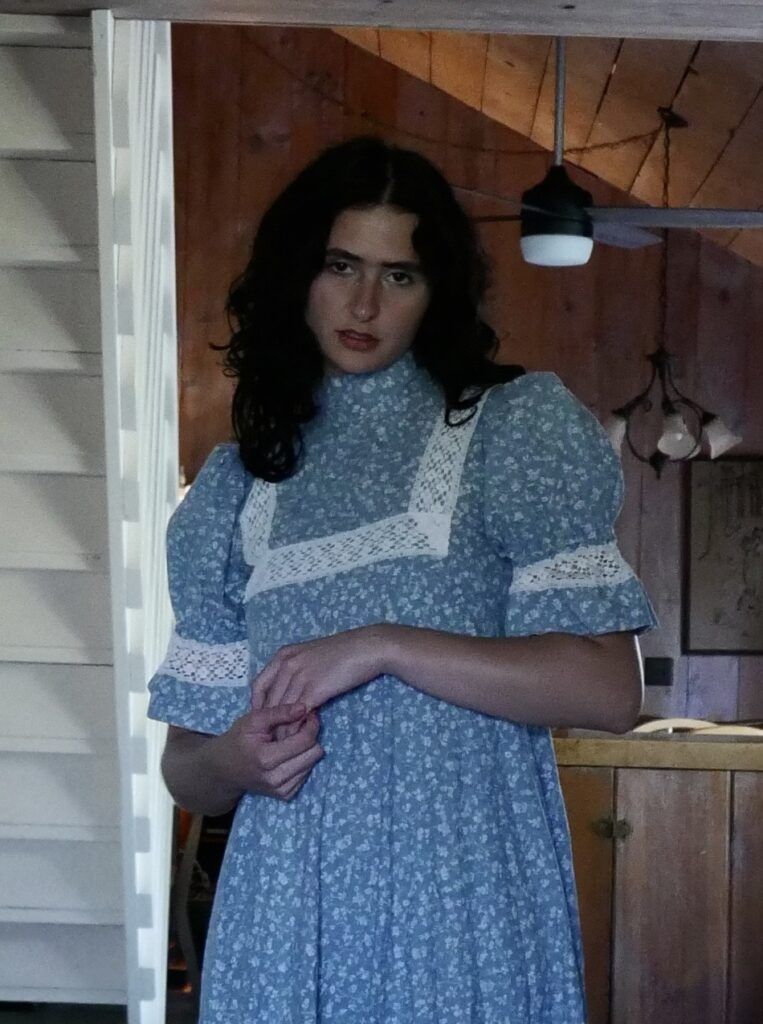Ariel K. Moniz (she/her) is a queer Black poetess and…
Giselle Linder is an Australian-born poet, artist, and actress currently based in Paris, France. Her debut poetry collection, City Gothic, was released in 2023 by indie publisher Dark Thirty Poetry Publishing, and was followed by a sophomore collection, Are You Having a Good Time Yet?, in March 2025.
Her work has also been included in various magazines and literary reviews by publishers such as Querencia Press, Eloquentia Magazine, Lilith’s Diaries and Bread and Butter Magazine.

You are an actress and a poet. Could you share with us what that means to you and what led you to pursue these creative forms?
I’ve always really enjoyed being a storyteller, no matter the medium. I loved prose before I loved poetry, and writing in general before I turned my attention to acting. The stories we tell each other and ourselves are there to help us make sense of the daily muck and mire, and I’ve always wanted to contribute to that process in some capacity.
I think I pursue these creative forms simply because I have a compulsion to. Life for me has always existed on two separate planes, the concrete world and the imagination; the imagination interprets and builds off of the concrete, and in turn space needs to be made in the concrete world for the imagination. Ever since I can remember I’ve sort of been living in my head.
I can’t imagine not being an artist. The only other thing I can envision myself maybe doing is working in a funeral home. I might look into that when I’m a bit older.
I have seen you perform your poetry in Paris and you have quite the stage presence. How much of your passion for acting do you feel you bring to your spoken word performances? Does the passion spring from the same well or do you feel you tap into a different part of your creative self dependent on the artform?
Thank you so much! I think that my passion for performing as a poet comes from the same place as my passion for performing as an actress, but engaging in them activates different parts of me.
As an actress I feel like a small part of something larger, which is a nice way to feel. A good director is going to give me lines, and I’m going to colour in between them. My main hope is always that I’m doing the character justice. Whereas when I’m performing as a poet, it feels more like inviting people into a world that I specifically have curated, whether that be for five minutes or an hour.
I feel like when I’m acting, especially on stage, I’m trying to externalise my inner experience. On the other hand, poetry, though it’s still an outward communication of an inner world, strangely feels less like delivering myself out to the audience, and more like trying to bring them into me. I’m trying to work on being more willing to infuse emotion when it organically wants to come out, but generally speaking, once the stage fright has died down, I feel very meditative when I’m performing poetry.

Anyone who comes across you will be sure to notice that you have a very alluring and distinctive aesthetic, particularly in the way you dress and present yourself. Could you share with us how (and if) this essence is tied to your creative work?
I definitely think my aesthetic and my work are intertwined, as fashion is an artform in and of itself. I’ve been really into vintage fashion for about half my life now, which came about because I got really into old movies and music when I was younger. I worked my way through many of the classics, and I had a deep obsession with Marilyn Monroe and Rita Hayworth. I was really into David Lynch too, especially “Twin Peaks” and “Mulholland Drive”. I listened to a lot of jazz, especially because I started learning how to swing dance, and got obsessed with Bruce Springsteen, as well as starting to listen to Lana Del Rey, which really influenced me. As a result, I think I call in a lot of imagery from projects that were either made in or capture elements of a bygone era. I don’t have any wish to have been born in a different generation, but I do think there’s something really special about old 35mm film full of people who are no longer with us, or boxes hidden in the back of antique centres that are full of unworn vintage lingerie, and old postcards and things like that. I like disappearing into things that are full of ghosts, and I guess that shows in both my poetry and my aesthetic.
Additionally, speaking of Paris, what brought you to the city? It is known as a haven for creatives, but what was it that moved you to base yourself in this particular city? Is Paris what you expected it to be, and do you feel that it directly affects your work?
I was fortunate enough to visit Paris when I was younger, and it really left an impression on me. I always felt that I wouldn’t live in Brisbane, it was such a strong idea that it would’ve been strange to stay, even though it has a special place in my heart. It seemed like it made sense to come to Paris, especially when I applied for a theatre university here and got accepted.
Paris is and isn’t what I thought it would be. I wasn’t surprised by the fact that it can be dirty and polluted and the weather can be terrible, all of which often disappoints tourists. But I was only 18 when I came here and was drawn in by stories of artists falling into step with one another organically and forming communities easily, which is what I desperately wanted. I learnt pretty quickly that it was a bit of naive thought though, and it wasn’t something that was going to happen right away. It takes time to build community, and it’s honestly still a work in progress. I never really had a deep sense of belonging anywhere, and moving to one of my dream cities forced me to confront that fact. But growing older and finding some good friends and communal spaces and my own corners of the city has helped me make peace with that. Maturing has shown me that you just can’t expect any one place or person to plug up the holes in your soul.
I feel that my work is influenced by and in conversation with the city, but not as directly as I thought it would be. I feel like it’s often easier for me to talk about something when it’s over, and Paris is still an ongoing love affair for me. I definitely have poems that take place here or mention the city by name, but I’ll probably write so much more about it if I ever leave. When I lived in Australia I almost never wrote about it, but I’ve been exploring it much more since I moved to Paris, and I’ve become particularly interested in the Australian gothic genre. Similarly, I feel like America shows up a lot in my poetry, especially places like New Orleans and Nashville, even though I haven’t lived there, I’ve just visited – but it’s because they’re closed chapters now, and therefore easier to look back on and consider.

Being based in a city with such a deep history in the arts, could you share a bit with us about what you feel the role of art, particularly poetry and performance art, plays in today’s living creative scene, both in Paris and the other creative spaces you find yourself in? What do you feel it means to be a creative in the modern age?
Paris is so special, because there’s art everywhere. You get to see magic on huge stages and in dive bar basements alike, pretty much any given night of the week. Creating here in such a historic place feels like keeping a legacy alive, but while also challenging that legacy, questioning it, and diversifying the voices who contribute to it.
I think the role of the artist is to foster connection and to, in certain moments, become a vessel for feeling. It’s always been that way, but it’s especially important right now in the modern age because it can feel like empathy in the world is so lacking sometimes and it’s so heartbreaking to see. All we have is each other. Performing poetry is particularly special because you create alone and then come together to share it, both of which feel wholly necessary at different moments.
You have published a book of your poetry with Dark Thirty Poetry Publishing, titled “City Gothic”, under your pen name Giselle Linder. Firstly, congratulations! Could you share with us a bit about this collection and what inspired it?
Thank you so much! It feels like “City Gothic” came out so long ago, even though it’s only been two years. I think that specific collection came out the way it did precisely because I relocated to Europe. My hometown Brisbane isn’t a small town but it has small town sensibilities in a way – it’s geographically huge but a lot of that is suburbia. It feels very spread-out and sleepy and it feels like life moves at a slower pace. A lot of it is also very new, partially because Australia is a young country and partially because there doesn’t seem to be a lot of interest in preserving old architecture.
Living in a city like Paris is so different for me, with everyone crushed in and living on top of one another in this very old, historic place. The streets are so narrow; on a good day Paris is like a comforting cocoon, and on a bad day it’s terribly claustrophobic. It made everything so heightened for me, like I could physically feel everyone’s lives happening all at once. I was in love, but also nervous all of the time, and very starstruck by everywhere I travelled, whether that be exploring within Paris, or going to a city like Berlin, which was always a big dream for me. The poems in “City Gothic” were essentially born out of that mess of new emotional and physical sensations. It was a narrative of night-time wanderings, and ruminations on the concept of home, and telling stories of having one-night stands and witnessing murders against the backdrop of these old European cities which are pulsing with history and hauntings.
We noticed that you released your poetry collection under a penname. Could you tell us why you chose to use a penname and what inspired the name Giselle Linder specifically?
For me, it made sense to create a character. Part of it is because I tend to be shy and self-conscious, so feeling like I have a vessel to pour that vulnerability into when I’m publishing or performing is very comforting. The other part of it is because of my Old Hollywood obsession, which made me very fascinated by the concept of persona, because of course most of the actresses from that era didn’t go by their birth names. But I don’t particularly mind if people want to call me Giselle or by my given name, Claudia.
I took ‘Giselle’ from the ballet of the same name, which is about a girl who dies of heartbreak and then is called back from beyond the grave by the ghosts of unmarried women who dance men to death as revenge for their wrongdoings. And ‘Linder’ is from Max Linder, a French silent screen star. He died in a suicide pact with his wife in 1925.
The process of publication can be a complicated one at times. Would you mind sharing what this process was like for you, and what advice you might give others who are on the path to getting their work published?
Looking back on the publishing process, it feels like it was so easy and so difficult at the same time. I definitely remember a lot of rejection, but when I met a publisher who was interested in my work entirely by accident, it clicked and became simple. It’s hard with creative things, so much happens because you’re just in the right place at the right time – like I was an extra in a François Ozon movie a few years ago, not because I applied but because the casting team saw me walking to the post office and thought I fit the 1930s vibe they were looking for. Which is really cool, but obviously at the time it left me with no ideas on how to get similar gigs.
If I can give advice, it would just be to stay open to everything and make connections with other creatives. Collaboration and community are so important, it’s good for the soul but also you never know what will come of it. I’d also say you have to find a balance between being willing to take advice and criticism, but also standing strong with your creative voice, truly knowing yourself and what you want to say.
Also, talk to other artists about rejection. Sometimes I receive a rejection and I feel like shit and I convince myself that I’m actually horrible at what I do, and then I go and catch up with artists who I honestly perceive to be much more talented than myself and they mention off-handedly that the same thing happens to them, and it reminds me there’s nothing to worry about, and we’re all pushing ahead in our own way. It becomes such a scary, big thing when you’re alone and sitting in it. But when you’re all open about it with each other, it becomes much easier to remind yourself that rejection is very seldom about not being talented, and much more about not gelling with someone’s personal taste or not being a good fit for their magazine/company. Moreover, it’s important to keep in mind that not appealing to everyone is a good thing, it means you are particular and possess individuality. “A friend to everyone is a friend to none” and all that.
As creatives, we almost always draw inspiration from other creatives. What are some of your all-time favorite poets/poems and performances? What works (by yourself or other creatives) would you suggest to those who might enjoy your work?
I’d say my literary foundation was initially formed around the classics – I love confessional poetry, I started reading Sylvia Plath when I was 13 and she devoured me whole. To this day, “Electra on Azalea Path” is one of my favourite poems. Gothic literature has also been incredibly significant to me, especially poets like Edgar Allan Poe and works like Wuthering Heights and The Picture of Dorian Gray. I was also very heavily shaped by the Beat Generation, I especially really loved Kerouac as a teenager. Seeing that video of him on the Steve Allen Show reading from On The Road still sends electricity running all through my body.
Now, I’ve shifted away from having a solely classic palate and I like to draw my inspirations from everywhere. I remember when I was 18 I read an article in a literary magazine saying that a person’s bookshelf is often a representation of them; I had been slowly but surely working my way through the most popular of the western canon, and realised that because of the suppression of diverse voices, this was not something that was true for me. That article made me want to remedy that. I don’t expect figures from other times to uphold modern standards of morality, but it’s also important to engage with artists who are pushing forward. It’s sort of heartbreaking to be a young woman and grow up and realise your male idols would never have taken you seriously, and that your visions of being on the road like Kerouac would not come to fruition – or at least, not without a heavy element of danger, the constant threat of violence at the hands of strange men. Even Plath’s work is woven with prejudice that has to be acknowledged.
I haven’t abandoned the past completely – for instance, I became entranced by William Faulkner last year. Soldier’s Pay is one of my favourite novels now, the prose is so incredibly rich and evocative – but I engage with contemporary literature much more now. I love Ada Limon’s Bright Dead Things and Maggie Nelson’s Bluets and The Red Parts. I’m obsessed with Jazz by Toni Morrison. I think everyone should read Deaf Republic by Ilya Kaminsky.
I’m very inspired by the people I know too. I often go to open mics in Paris or chat with other writers online, and I love hearing about what the people around me are working on and drawing inspiration from them. For instance, I adore Antonia Alexandra Klimenko’s poetry collection, On The Way To Invisible and Nicolette Daskalakis’ collection Tell Me I’m Not On Fire, they’re both Paris-based. And I remember being in Tennessee last summer in this commune deep in the woods with my friend Steph Bruzon, reading our poetry to each other in that creepy bedroom in the black and just soaking it all in. We often talk of our artistic similarities, and if you like my work you would definitely like hers. She also read some of Jordan Marcum’s poems to me, who is absolutely amazing. Her work reminds me a lot of Frank O’Hara, but she’s also wholly herself.
Some of my favourite poetry readings are Florence Welch reading Mary Oliver’s “Wild Geese”, Tom Hiddleston’s reading of T.S. Eliot’s “The Love Song of J. Alfred Prufrock”, and June Jordan reading her “Poem About My Rights”. I could truly talk about literature I love forever and ever.
What are your goals for your creative practice moving forward? Are there any particular projects you have in mind that you are excited to bring to life?
In art and in life, I’m trying to always give myself permission to get weirder, and to be more sincere.
As for future projects, I’m planning on recording some spoken word tracks later this year, which is what I’m most excited about. At this stage a friend of mine will be doing the instrumentals for me, but I have to wait and see if everything will align. But I want to make it happen either way. I love world-building, so I would also love to create really specific cover art and videos for each of the poems. It will be a mix of a few new things and some poems that were included in my recent collection, Are You Having a Good Time Yet?. I’m really looking forward to giving those existing poems a second life and delving into them from a different angle.
Finally, what media/music/miscellany have you been loving lately?
I’ve been flitting between so many different things lately.
Musically I’ve been loving Nina Simone, Amyl and the Sniffers and Mazzy Star, and I’ve been really into Nicole Dollanganger’s album Natural Born Losers recently too. Other than that, I listen to Ethel Cain so much of the time, I think she’s a visionary. Lately I’ve also had “The Future” by Leonard Cohen and “Chicken Pussy” by Bongwater on repeat when I’ve been walking around Paris.
I try to come back to Mary Oliver’s poetry whenever I can because she makes me happy to be alive. My favourite poem from her is “The Fourth Sign of the Zodiac”, and I have a section from “Wild Geese” tattooed on my forearm. And I read “The Dry Heart” by Natalia Ginzburg recently – I found it intensely moving, perhaps I’ve found a new favourite novel.
I think I’ve been letting my cinephile friends down because I haven’t been watching many movies lately – I think the most recent one I saw was Picnic at Hanging Rock at the cinema in London with my friend. But I’ve had things like Thelma and Louise, Natural Born Killers, Lisa Frankenstein and Badlands on my mind all the time for a while now – I’m incredibly partial to any film in which two lovers go on a murder spree.

Ariel K. Moniz (she/her) is a queer Black poetess and Hawaii local currently living abroad. She is a co-founder of The Hyacinth Review, and serves as a poetry reader for The Lumiere Review as well as the social media manager for Liminal Transit Review. She is the winner of the 2016 Droste Poetry Award and a Best of the Net nominee. Her writing has found homes with Blood Bath Literary Zine, Sledgehammer Literary Journal, Black Cat Magazine, and Sunday Mornings at the River Press, among others. She holds a B.A in English from the University of Hawaii at Hilo, where she once served as the editor-in-chief of Kanilehua Art & Literary Magazine. You can find her on her website at kissoftheseventhstar.home.blog, on Twitter @kissthe7thstar, on Instagram @kiss.of.the.seventh.star, or staring out to sea.









